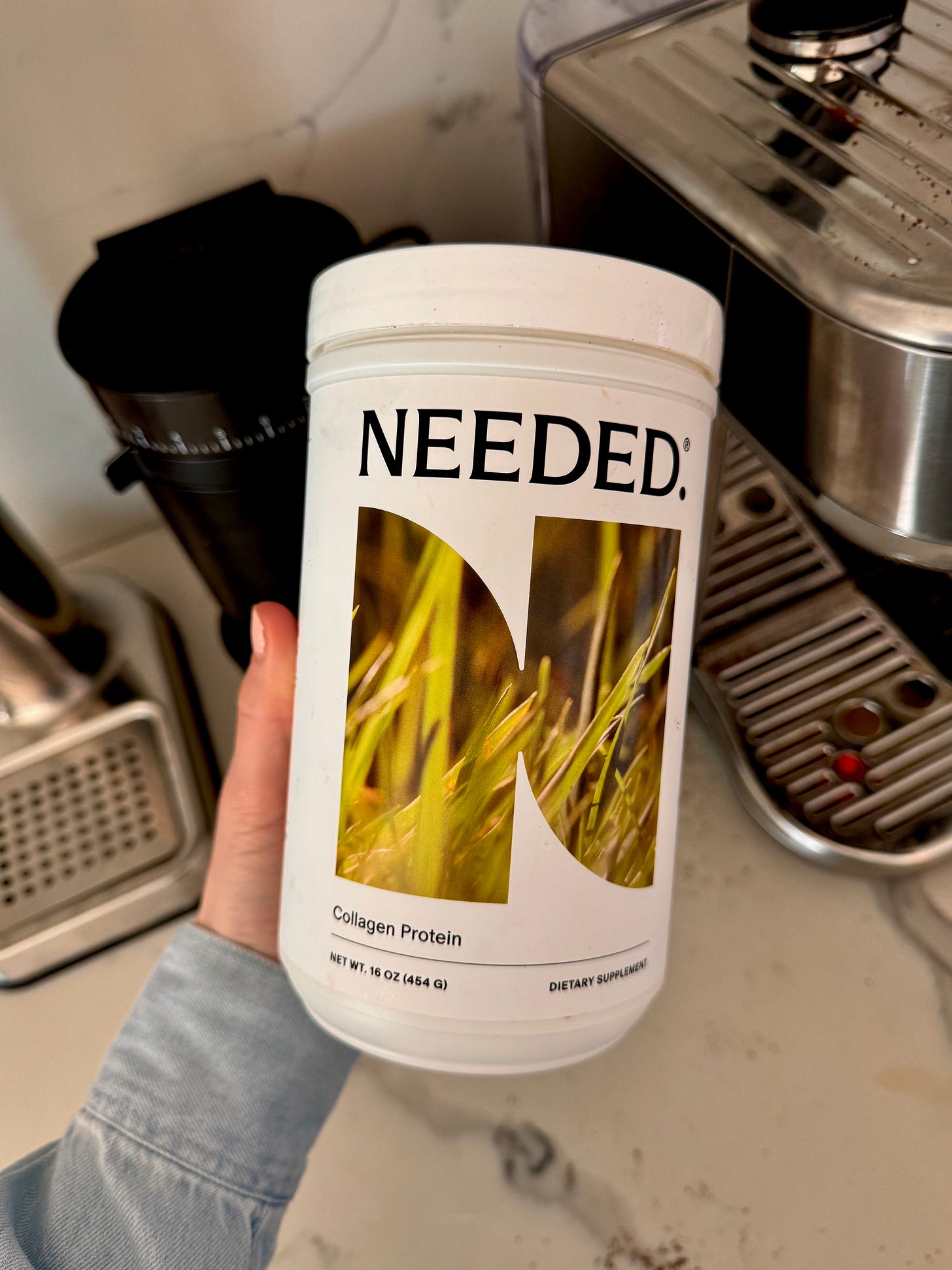Collagen supplements have become increasingly popular over the past few years, and if you’ve been here a while, you’re probably well aware of my love of Needed’s collagen. I have used this in my coffee daily for nearly two years and attribute many benefits to it (keep reading). In today’s post we’re doing a deep dive into collagen—what it is, the science, the benefits, and how to use it, so you can decide if it’s right for you.
First of all, what is collagen?
Collagen is the most abundant protein in the body (and that of all animals). It plays a key role in the structure of skin, hair, nails, bones, tendons, ligaments, and connective tissues. Your body creates collagen, but production declines with age and can lead to telltale signs of aging: wrinkles, reduced bone density, joint pain, loss of flexibility, and more. Hormonal changes—like reduced estrogen after menopause and stress—can accelerate collagen loss as well.
Understanding how collagen works in the body takes a foundational knowledge of protein and amino acids, so here’s a little nutrition science refresher:
Protein is made of amino acids. When we consume protein, our body breaks it down into amino acids which are then absorbed and rebuilt into the proteins that our body needs—this includes antibodies for the immune system, protein-based hormones like insulin, enzymes to digest our food, transport proteins like hemoglobin and ferritin, structural proteins like collagen and keratin, and more (proteins are multifaceted and important).
There are twenty different amino acids, of which nine are essential (meaning our body cannot make them and they have to be consumed in our diet). Collagen is a particularly good source of the amino acids glycine and proline–two amino acids that can be difficult to get from food unless you’re thoughtful about eating foods that are rich in them. Glycine and proline work synergistically to support tissue repair, maintain strong bones and joints, and improve the health of our hair and nails.
Foods that contain all nine essential amino acids (the building blocks of protein) are called complete proteins. Collagen is not a complete protein—it’s missing the amino acid tryptophan. This is a point of a lot of confusion, so let’s clear some things up. Collagen protein supplements (basically just a type of protein powder) still provide amino acids to support your body's needs, but should be complemented by consuming other foods that do have tryptophan, like chicken, turkey, eggs, fish, soy, nuts, seeds, legumes, or whole grains. If you’re eating a balanced diet, this should not be an issue.
When you consume collagen, like any protein, it will get broken down into amino acids, absorbed and then rebuilt. So, consuming collagen doesn’t directly replace lost collagen, but gives your body the tools to rebuild it more efficiently.
Collagen Supplements
While you can consume collagen from animal products (bone broth is a great source), I love a hydrolyzed collagen supplement because it’s already broken down into a very absorbable form, making it easier for your body to create new collagen proteins. I’ve tried many different brands, and Needed is my favorite because of the quality (it’s literally just one ingredient: hydrolyzed bovine collagen) and how easily it mixes.
Since collagen comes from animal tissue, it is not found in plants. And thus: there are no vegan or plant-based collagen sources. Any non animal based collagen supplement is helping with your body’s natural production of collagen but does not actually have collagen (and most don’t have strong amino acid profiles).
To get the most bang for your buck with your collagen supplement, I’d recommend taking it regularly and consuming alongside Vitamin C, Copper, and Zinc, all of which support collagen formation. A good quality multi vitamin and balanced diet will do this for you.
There’s also strong research that supports taking vitamin C and collagen together to accelerate wound healing, improve skin elasticity (wahoo!), joint strength, and connective tissue. You don’t need to take them at the same time, just make sure that you are getting adequate amounts of both.
I’ve been adding Needed’s collagen to my coffee every morning for the past two years and have experienced some notable differences and benefits to this daily ritual:
It’s helped me increase my daily protein intake and balance my blood sugar. My flat white with collagen and organic soy milk has over 20 grams of protein (exact recipe linked), which is a great way to get a head start on my daily protein goals (I try to eat 100-130 grams of protein a day). I’m very focused on building healthy muscle tissue and my coffee alone provides roughly 20% of my protein for the day.
My hair, skin, and nails feel healthier than ever. I started adding collagen to my coffee while I was pregnant with my daughter Freya. My hair is longer and fuller than it’s ever been. Even my hairdresser remarked on how much better my hair feels after this pregnancy compared with my last.
Needed’s collagen is heat stable, flavorless, and mixes easily. Here are some great ways to enjoy it:
In coffee or tea with any nut or dairy milk
In oats (see my high protein, low carb oat recipe)
In a smoothie
In baked goods like muffins, breads, or even pancakes
This post was brought to you by my friends at Needed (who are also well aware of my collagen coffee obsession). If you would like to give it a try, use the code MIA20 for a discount on Needed’s collagen (and all their products).









Loved this post and info—needed this reminder on how important collagen is! I also love how there is a heart shape in your coffee! 🤍
This was such a helpful post! I did collagen in coffee for awhile but got out of the habit. Need to start up again!
Mia, do you have a POV on powder collagen vs liquid collagen? I recently saw something on the IG algorithm about Spoiled Child liquid collagen and I’m just hesitant about anything IG serves me 😂